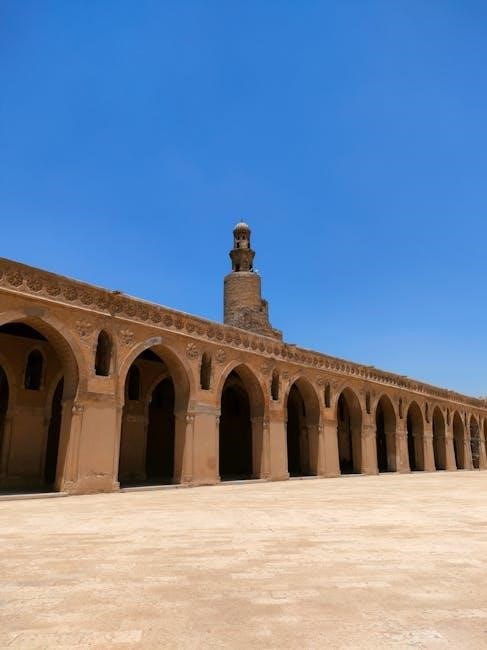Ibn Khaldun‚ a 14th-century historian‚ is renowned for The Muqaddimah‚ a seminal work in Islamic scholarship. This treatise introduces his pioneering theories on history‚ society‚ and state formation‚ blending sociology‚ economics‚ and philosophy. It critiques traditional historiography‚ offering a systematic approach to understanding historical patterns and the cyclical nature of civilizations. The Muqaddimah remains a cornerstone of Islamic thought and continues to inspire modern social sciences with its profound insights into human societies and governance.
Overview of Ibn Khaldun’s Life and Contributions
Ibn Khaldun (1332–1406) was a Tunisian historian‚ sociologist‚ and Islamic scholar. Born into a prominent family‚ he experienced political turmoil and migrations‚ influencing his intellectual journey. His magnum opus‚ The Muqaddimah‚ laid the groundwork for modern historiography and social sciences. Khaldun’s unique approach combined historical analysis with sociological insights‚ critiquing traditional narratives and proposing theories on state development and societal structures. His work remains foundational in understanding Islamic civilization and human history.
The Significance of The Muqaddimah in Historical Literature
The Muqaddimah is a foundational work in Islamic scholarship‚ blending history‚ sociology‚ and philosophy. It introduced pioneering theories on state formation‚ societal cycles‚ and historical analysis‚ challenging traditional narratives. As a precursor to modern social sciences‚ it provides a comprehensive framework for understanding human societies and civilizations. Its influence extends beyond Islamic thought‚ offering timeless insights into historical dynamics and the nature of power‚ making it a cornerstone of historical literature.
The Historical Context of The Muqaddimah
The Muqaddimah was written in the 14th century‚ a period marked by significant political and intellectual shifts in the Islamic world‚ influencing Ibn Khaldun’s historical perspectives.
The Time Period and Influences on Ibn Khaldun’s Writing
Ibn Khaldun wrote The Muqaddimah during the 14th century‚ a period marked by political upheaval and intellectual transformation in the Islamic world. The decline of the Abbasid Caliphate and the rise of regional dynasties influenced his historical perspective. His exposure to diverse cultures‚ including Arab‚ Berber‚ and Persian societies‚ shaped his understanding of societal dynamics. These influences are reflected in his analysis of state formation and the cyclical nature of civilizations‚ making The Muqaddimah a comprehensive and innovative work in Islamic scholarship.
The Socio-Political Climate of the Islamic Golden Age
The Islamic Golden Age was marked by cultural flourishing and intellectual advancements‚ yet it also faced challenges like political fragmentation and regional conflicts. The decline of central authority and the rise of local dynasties created a complex socio-political landscape. Ibn Khaldun’s observations of these dynamics deeply influenced his theories on state formation and societal cohesion. This period’s mix of diversity and instability shaped his understanding of historical cycles and the role of solidarity in civilizations.

Ibn Khaldun’s Five-Phase Theory of State Development
Ibn Khaldun’s theory outlines five phases of state development: formation‚ expansion‚ consolidation‚ decline‚ and collapse. This cyclical model emphasizes the role of solidarity (asabiya) and institutional decay.
Formation Phase: The Emergence of a State
The formation phase‚ as outlined by Ibn Khaldun‚ begins with the unification of groups under a charismatic leader. This stage relies heavily on asabiya‚ or social solidarity‚ which binds individuals together for common goals. The leader’s authority is initially informal‚ often rooted in tribal or religious ties. As the group grows‚ rudimentary political structures emerge‚ marking the transition from informal alliances to a centralized state. This phase sets the foundation for the state’s future development and stability.
Expansion Phase: Growth and Consolidation of Power
The expansion phase‚ as described by Ibn Khaldun‚ involves the consolidation of power and territorial growth. A strong ruler leverages military prowess and strategic alliances to expand the state’s boundaries. This period sees the establishment of administrative systems and the promotion of economic prosperity. The state’s influence reaches its peak‚ with cultural and scientific advancements flourishing. However‚ the seeds of decline are subtly sown as internal cohesion begins to wane‚ setting the stage for future challenges.
Consolidation Phase: Stability and Institutionalization
The consolidation phase marks a period of stability where institutions are established‚ and governance becomes more organized. Laws and administrative systems are formalized‚ ensuring efficient management of the state. Economic prosperity and social order are maintained‚ fostering a sense of unity and shared identity. This phase is crucial for the state’s longevity‚ as it lays the foundation for enduring governance and cultural advancement‚ ensuring the state’s stability before potential challenges arise;
Decline Phase: The Erosion of Solidarity and Power
The decline phase is marked by the erosion of solidarity‚ or ‘asabiya‚ which once united the state. Internal conflicts arise as cohesion weakens‚ leading to power struggles and fragmentation. Corruption and mismanagement further destabilize the state‚ while external pressures exploit its vulnerabilities. The loss of strong leadership and moral authority accelerates the decline‚ ultimately rendering the state susceptible to collapse. This phase underscores the cyclical nature of history‚ as described by Ibn Khaldun.
Collapse Phase: The End of a State’s Cycle
Collapse Phase: The End of a State’s Cycle
The collapse phase marks the final dissolution of a state’s authority‚ as internal decay and external pressures culminate in its downfall. The loss of ‘asabiya and moral legitimacy leaves the state defenseless‚ leading to fragmentation or conquest. This phase is irreversible‚ as the state’s social and political structures disintegrate. The collapse paves the way for a new cycle‚ as emerging groups rise to establish fresh political orders‚ reflecting Ibn Khaldun’s cyclical view of history.

The Concept of ‘Asabiya in The Muqaddimah
‘Asabiya‚ or social solidarity‚ is a central concept in Ibn Khaldun’s theory‚ describing the cultural and social bonds that unify groups and drive historical change. It is essential for state formation and stability‚ influencing both cohesion and conflict within societies.
Definition and Role of ‘Asabiya in State Formation
‘Asabiya‚ or social solidarity‚ is a collective identity binding groups through shared values and loyalty. It is crucial for state formation‚ enabling leaders to unify disparate tribes and establish authority. Strong ‘asabiya fosters cohesion‚ driving a group’s rise to power. However‚ it tends to weaken as states expand‚ leading to decline. Ibn Khaldun viewed ‘asabiya as the cornerstone of political and social stability‚ essential for the emergence and survival of dynasties in cyclic historical patterns.
The Impact of ‘Asabiya on Social Cohesion and Conflict
‘Asabiya fosters social cohesion by creating a shared identity and loyalty among group members‚ enhancing collective action and stability. However‚ it can also fuel conflict when strong ‘asabiya leads to exclusivism‚ fostering rivalry between groups. Ibn Khaldun observed that while ‘asabiya is vital for state formation‚ its decay or misapplication can lead to internal strife and societal fragmentation‚ highlighting its dual role in shaping both unity and division within societies.
Political‚ Social‚ and Historical Trends in The Muqaddimah
The Muqaddimah examines political‚ social‚ and historical trends across Arab‚ Berber‚ Persian‚ and European civilizations. It provides a comprehensive analysis of their structures‚ dynamics‚ and transformations‚ offering insights into the interconnectedness of culture‚ power‚ and societal evolution during the Islamic Golden Age and beyond.
Analysis of Arab Civilizations
Ibn Khaldun’s The Muqaddimah delves into the rise and decline of Arab civilizations‚ emphasizing their unique societal structures and the role of ‘asabiya in fostering unity. He explores how Arab societies transitioned from tribal allegiances to centralized governance‚ influenced by Islamic ideals. Khaldun’s analysis highlights the cyclical nature of their history‚ offering insights into the interplay of culture‚ religion‚ and political power that shaped their Golden Age and subsequent transformations.
Examination of Berber and Persian Societies
Ibn Khaldun’s analysis extends to Berber and Persian societies‚ highlighting their governance structures and cultural influences. He explores how these societies navigated the challenges of state formation and decline‚ emphasizing their unique historical trajectories. Khaldun’s work provides a comparative perspective‚ illustrating how these civilizations fit into his broader theories on the cyclical nature of history and the role of social cohesion in shaping their destinies.
Insights into European Civilizations of the Middle Ages
Ibn Khaldun’s The Muqaddimah offers insights into European civilizations during the Middle Ages‚ examining their political structures‚ social dynamics‚ and historical developments. He highlights the rise of feudal systems‚ religious influences‚ and the interplay of power among European kingdoms. Khaldun’s perspective‚ shaped by his broader theories on state formation and decline‚ provides a unique lens through which to view medieval Europe’s role in the global historical narrative.

Critique of Traditional Historiography
Ibn Khaldun criticized traditional historiography for its biases and inaccuracies‚ advocating for empirical evidence and social context analysis while challenging myths and exaggerated claims in history.
Ibn Khaldun’s Approach to Historical Analysis
Ibn Khaldun’s approach to historical analysis emphasized understanding societal structures‚ economic factors‚ and cultural dynamics over mere chronology. He integrated sociology‚ economics‚ and philosophy to explain historical events‚ pioneering a multidisciplinary method. Khaldun critiqued traditional historiography for its biases and lack of depth‚ advocating for empirical evidence and contextual analysis. His systematic framework focused on identifying patterns in the rise and fall of civilizations‚ offering a groundbreaking perspective that laid the foundation for modern historiography and social sciences.
Challenges to Conventional Narratives of History
Ibn Khaldun challenged traditional historiography by introducing a new methodology that emphasized societal structures‚ economic factors‚ and cultural dynamics over simplistic chronology. He critiqued historians for focusing on events without understanding underlying causes‚ advocating for a more analytical approach. His emphasis on empirical evidence‚ contextual analysis‚ and the cyclical nature of history offered a fresh perspective‚ breaking away from conventional narratives and setting a new standard for historical inquiry.

The Legacy of The Muqaddimah
The Muqaddimah left an enduring impact on Islamic scholarship and modern social sciences‚ offering timeless insights into societal dynamics and historical evolution‚ remaining a foundational text for understanding human civilization.
Influence on Modern Social Sciences and Historiography
The Muqaddimah has profoundly shaped modern social sciences by introducing innovative methodologies for historical analysis and societal study. Its emphasis on systemic patterns and human agency influenced fields like sociology‚ economics‚ and political science. Khaldun’s concepts‚ such as ‘asabiya‚ continue to inspire contemporary research on social cohesion and state formation. His work remains a foundational text‚ bridging medieval Islamic thought with modern scholarship‚ offering timeless insights into human societies and historical evolution.
Relevance of Ibn Khaldun’s Theories in the Contemporary World
Ibn Khaldun’s theories remain remarkably relevant today‚ offering insights into modern societal dynamics. His concept of ‘asabiya helps explain social cohesion and conflict in diverse contexts. The cyclical nature of state formation and decline resonates with contemporary discussions on governance and political stability. Additionally‚ his methodologies for historical analysis provide a framework for understanding global trends and challenges‚ making The Muqaddimah a timeless resource for scholars and policymakers alike in addressing current issues.
The Muqaddimah stands as a timeless masterpiece‚ offering profound insights into history‚ society‚ and governance. Its relevance endures‚ influencing modern thought across disciplines and fostering a deeper understanding of human civilization.
The Muqaddimah explores the cyclical nature of civilizations‚ emphasizing the role of solidarity (‘asabiya) in state formation and decline. It critiques traditional historiography‚ advocating for a systematic analysis of historical patterns. Ibn Khaldun’s work examines political‚ social‚ and economic factors shaping societies‚ offering insights into the rise and fall of empires. His theories remain relevant‚ providing a framework for understanding historical and contemporary societal dynamics across diverse civilizations.
The Enduring Importance of The Muqaddimah
The Muqaddimah remains foundational in Islamic scholarship and modern social sciences. Its analysis of historical cycles‚ ‘asabiya‚ and societal evolution offers timeless insights; Ibn Khaldun’s critique of traditional historiography and his emphasis on empirical observation revolutionized historical study. His theories on state formation and decline continue to resonate‚ making The Muqaddimah a bridge between medieval and contemporary thought‚ ensuring its relevance in understanding global dynamics and human societies today.